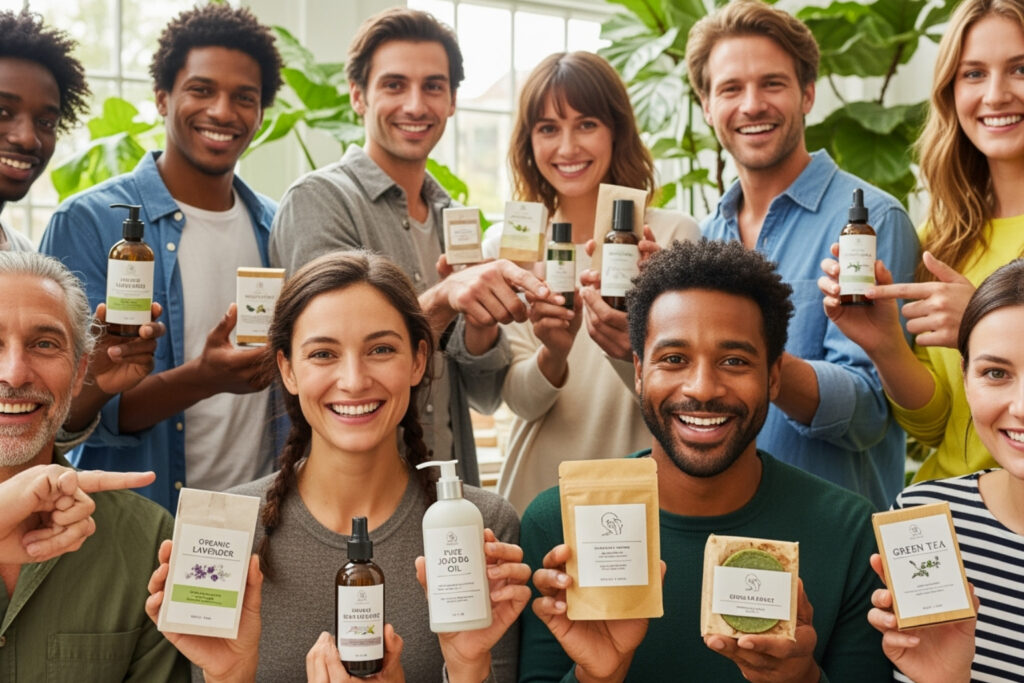What Makes a Beauty Company Truly Ethical?
Ethical beauty companies are changing the cosmetics industry by prioritizing people, planet, and purpose over pure profit. These brands operate with transparency, use sustainable practices, and ensure their products don’t harm animals, workers, or the environment.
Key characteristics of ethical beauty companies include:
- Cruelty-free – No animal testing at any stage of production
- Vegan formulations – Free from animal-derived ingredients
- Fair trade sourcing – Ensuring fair wages and working conditions
- Organic ingredients – Grown without harmful pesticides or chemicals
- Zero-waste packaging – Using refillable, recyclable, or biodegradable materials
- Ingredient transparency – Full disclosure of what goes into products
The global ethical beauty market is projected to reach $54.5 billion by 2027, with 86% of consumers willing to pay more for products from sustainable brands. This shift reflects growing awareness that traditional beauty habits can harm the environment through plastic packaging, animal testing, and unsustainable ingredient sourcing.
As one industry expert noted, “Beauty should not come at the cost of your health” or the planet’s wellbeing. Today’s conscious consumers are driving change by demanding brands that align with their values.
The beauty industry creates 120 billion units of packaging waste every single year. But ethical companies are pioneering solutions – from plastic-free packaging to regenerative agriculture practices that actually improve soil health while growing ingredients.
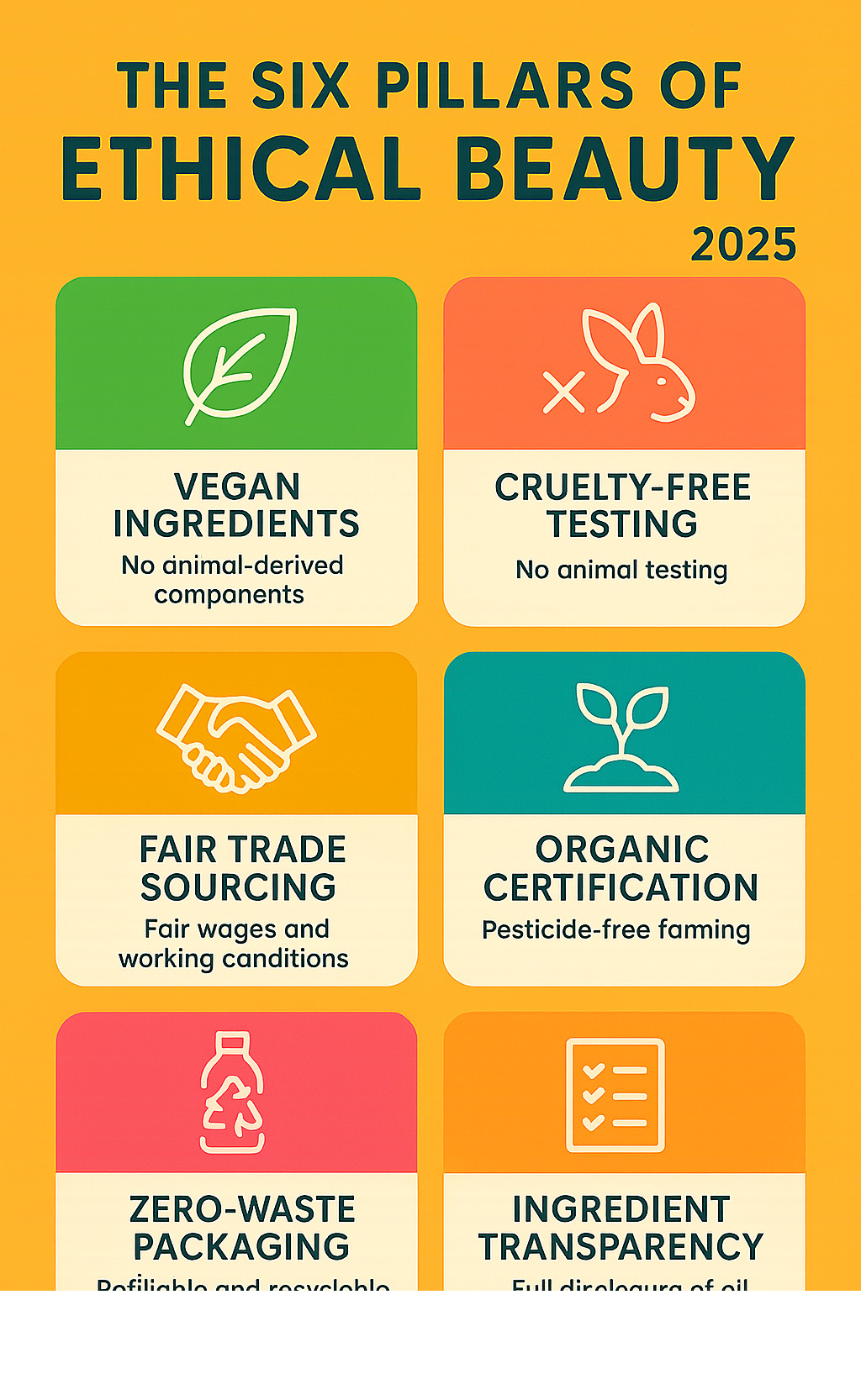
Glossary for ethical beauty companies:
The Pillars of Ethical Beauty: Brands Leading the Charge
When you’re searching for truly ethical beauty companies, you’re looking for more than just one good practice. The best brands accept a complete approach to sustainability and responsibility, considering everything from ingredient sourcing to packaging design and animal welfare.
Think of it like building a house – you need multiple strong pillars to create something that lasts. The beauty industry is changing, and the most inspiring brands are showing us what’s possible when ethics guide every decision. Understanding these key pillars helps you make choices that truly reflect your values.
This shift toward sustainable beauty practices isn’t just trendy – it’s essential for creating a healthier planet and a more equitable society.
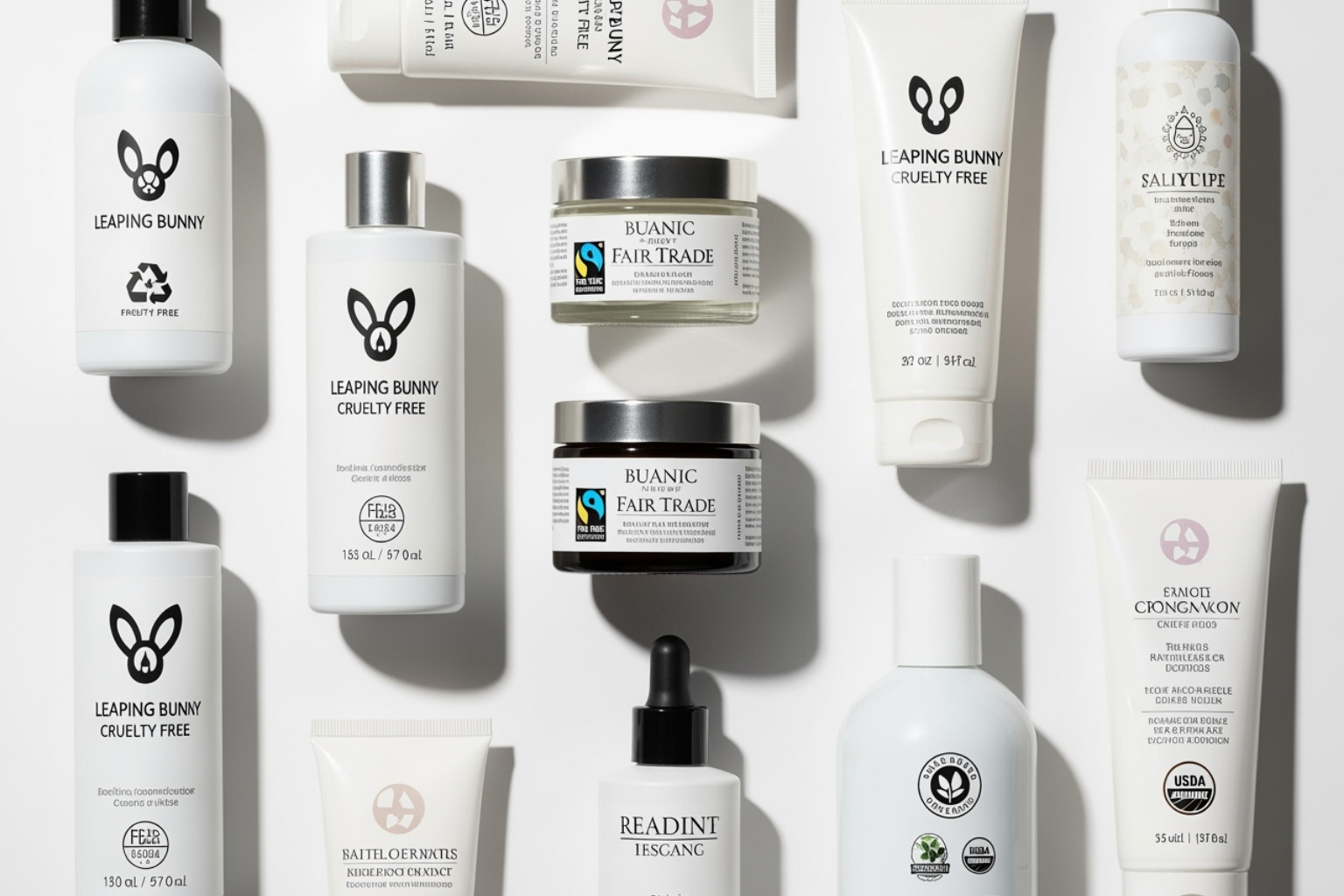
Spotlight on Leading Fair Trade Ethical Beauty Companies
Fair trade practices form the heart of truly ethical beauty companies. When you buy fair trade beauty products, you’re ensuring that the farmers and workers who grow ingredients like shea butter and argan oil receive fair wages and work in safe conditions.
This goes far beyond simple transactions. Fair trade builds lasting partnerships and invests in community development. The FAIRTRADE mark provides global certification, guaranteeing that companies commit to decent working conditions throughout their entire supply chain.
The Body Shop pioneered this approach with their Community Fair Trade program, which has operated for over 30 years. As the largest fair trade program in the cosmetics industry, they pay fair prices, offer favorable trade terms, and provide additional funding to support supplier communities.
Fair Squared takes a comprehensive approach with over 80 certified vegan and natural products sourced from 15 fair trade partners worldwide. They’ve even introduced returnable glass jars to promote circularity in their packaging.
Common fair trade ingredients you’ll find in ethical beauty products include shea butter (often sourced from women’s cooperatives in Africa), cocoa butter, argan oil, coconut oil, jojoba oil, and turmeric. These ingredients deliver wonderful benefits for your skin while empowering communities globally.
To understand more about these principles, explore What is Fairtrade?.
Certified Organic: Purity from Farm to Face
Just as you care about what goes into your body, you should care about what goes onto your skin. Organic beauty products use ingredients grown without harmful pesticides, herbicides, or synthetic fertilizers. This protects you from potentially irritating chemicals while supporting healthier soil, biodiversity, and cleaner environments.
When products carry organic certification, they meet rigorous third-party standards. In the EU, certified organic products must contain at least 95% certified organic ingredients.
Neal’s Yard Remedies leads the organic beauty movement as a modern apothecary crafting formulas with ethically sourced herbs, botanicals, and essential oils. Their handmade products come from an eco-factory in Dorset, England, earning them a perfect score from The Ethical Company Organisation plus CarbonNeutral(R) and Cruelty Free International certifications.
Green People’s founder Charlotte Vohtz was so committed to organic standards that in 1999, she encouraged the Soil Association to introduce organic standards for beauty products. She even joined their team to help design the first certification criteria.
Brands like Lovely Day combine organic botanical oils with active, vegan formulas produced in small batches, while HEJ organic carries NATRUE certification alongside organic seals and certifications from The Vegan Society and The Leaping Bunny.
For detailed guidance on choosing organic products, explore our Organic Beauty Guides.
Zero-Waste & Sustainable Packaging: Reducing Our Footprint
The beauty industry creates a staggering challenge with packaging waste. Every year, an estimated 120 billion units of packaging are used for beauty products, with around 95% ultimately thrown away. This is where zero-waste principles of “reuse, reduce, and recycle” become crucial.
Ethical beauty companies are embracing the circular economy, designing products with conscious life cycles that minimize environmental impact.
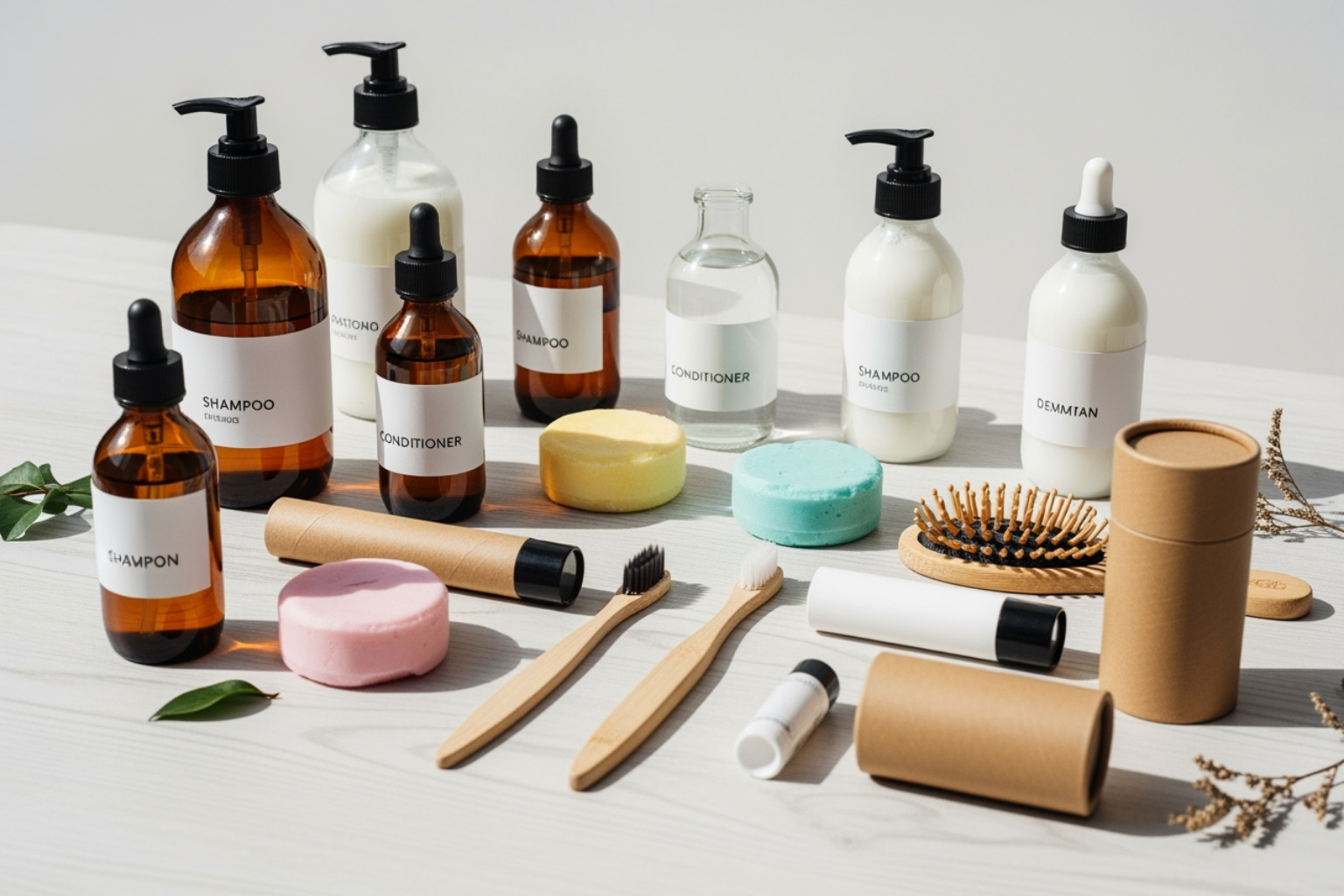
UpCircle Beauty exemplifies regenerative design with 99% plastic-free packaging and refill options. They even salvage leftover coffee grounds to create skincare products and use recycled coffee cups for marketing materials.
KINDBEEUTY launched an innovative ‘Return, Refill, Reuse, and Repeat’ scheme, incentivizing customers to return packaging for refilling and recirculation. Meanwhile, Axiology commits to 100% plastic-free color sticks using only 10 simple ingredients with tubeless application to reduce environmental impact.
Emma Lewisham achieves Climate Positive certification at the product level and offers a global Beauty Circle program, taking back all used packaging for refilling or recycling.
These innovations show how beauty can move toward a future without negative environmental footprints. Find more ways to reduce your impact with our Sustainable Beauty Packaging Guide.
Spotlight on Top Vegan & Cruelty-Free Ethical Beauty Companies
For many people, ethical beauty begins with ensuring no harm comes to animals. This involves two distinct but often overlapping concepts: vegan and cruelty-free.
Vegan products contain no animal ingredients or animal-derived ingredients like beeswax, honey, carmine, or gelatin. Cruelty-free means neither the finished product nor its ingredients have been tested on animals at any development stage.
While products can be cruelty-free but not vegan, the most ethical companies strive to be both. Certifications from The Leaping Bunny Program, PETA’s Beauty Without Bunnies, and The Vegan Society provide valuable consumer assurance through third-party verification.
PHB Ethical Beauty, a family-owned Birmingham business, pioneered ethical beauty with veganism and cruelty-free practices at their core. They avoid alcohol-based ingredients, toxic synthetic chemicals, and GMOs while donating 20% of profits to charities. They even guarantee their products are palm oil-free.
Love Beauty and Planet commits to developing products formulated and packaged with respect for animals and the planet. In the US, they hold independent cruelty-free and vegan certification from PETA, using packaging made from 100% recycled materials.
Brands like Juicy Chemistry ensure all products are vegan and meet ECOCERT standards, using plant-based butters for moisturizing results.
To explore more plant-based options, check out our guide on Ethical Vegan Skincare.
How to Identify and Support Ethical Beauty Companies
Walking down the beauty aisle can feel overwhelming when every product seems to claim it’s “natural,” “clean,” or “eco-friendly.” But here’s the thing – with a little detective work, you can become a savvy shopper who sees right through the marketing fluff. Ethical beauty companies are out there doing amazing work, and they deserve our support. The trick is learning how to spot the real deal.
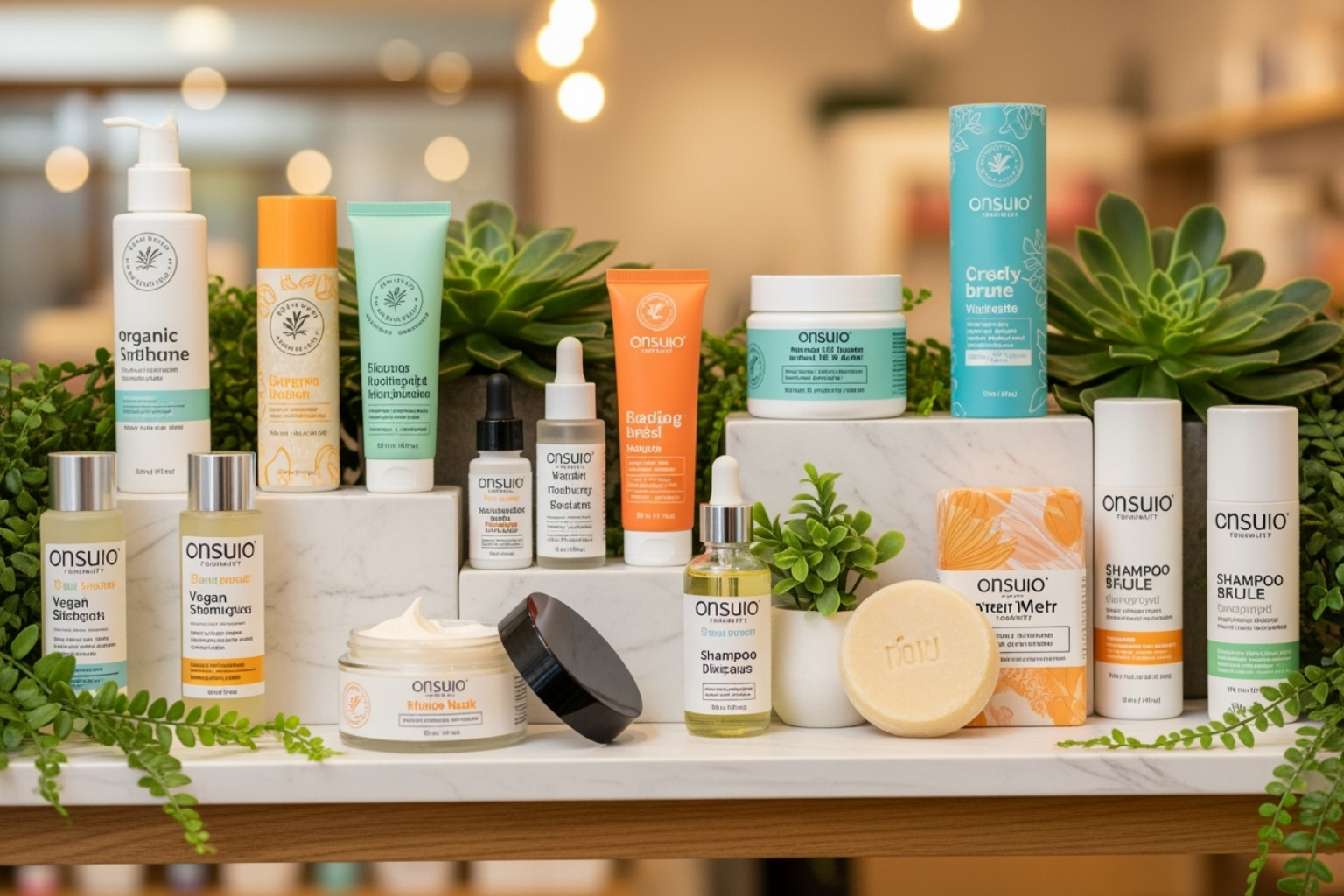
The beauty industry loves buzzwords, but we’re here to help you cut through the noise. When you know what to look for – and what to avoid – shopping for ethical beauty becomes so much easier. You’ll start spotting genuine non-toxic makeup brands and building a collection that truly aligns with your values.
Decoding Labels and Certifications
Think of certifications as your beauty shopping superpower. These little logos on packaging aren’t just decoration – they’re proof that an independent organization has verified a brand’s claims. No more wondering if that “cruelty-free” label actually means anything!
Here’s what the most trusted certifications really guarantee:
| Certification | What it Guarantees |
|---|---|
| Leaping Bunny | Products and ingredients are not tested on animals at any stage of development. |
| The Vegan Society | Products do not contain any animal ingredients or animal-derived ingredients. |
| FAIRTRADE Mark | Ensures fair wages, decent working conditions, and community development for farmers and workers in the supply chain. |
| ECOCERT/COSMOS Organic | Guarantees minimum organic content (e.g., 95% for EU organic), environmentally friendly production processes, and responsible resource management. |
| B Corp (Certified B Corporation) | A holistic certification for companies meeting high standards of verified social and environmental performance, public transparency, and legal accountability to balance profit and purpose. |
These certifications matter because they involve rigorous third-party verification. Companies can’t just slap these logos on their products – they have to prove they meet strict standards. When you see these symbols, you can shop with confidence knowing the claims have been independently verified.
Ingredients to Watch Out For
Now for the not-so-fun part – the ingredients that make us want to put products right back on the shelf. Don’t worry though, once you know what to avoid, it becomes second nature to scan ingredient lists like a pro.
Parabens and phthalates are probably the most well-known troublemakers. These preservatives and plasticizers have been linked to hormone disruption and other health concerns. You’ll often see them listed with names ending in “-paraben” or hiding in “fragrance” on labels.
Formaldehyde and triclosan are two more ingredients that raise red flags. Formaldehyde is a known carcinogen that’s sometimes used as a preservative, while triclosan is an antibacterial agent that can disrupt hormones and contribute to antibiotic resistance.
But here’s the ingredient category that really gets our attention: PFAS, or “forever chemicals.” These per- and polyfluorinated substances earned their nickname because they practically never break down in the environment. They’re hiding in mascara, foundation, and liquid lipstick, making our makeup routine a potential source of exposure to these toxic chemicals.
The scary part? Major beauty brands are still using PFAS despite growing concerns. The BBC found PFAS in many UK makeup products, and Swedish investigations revealed their presence in products from major cosmetics companies. Even the Swedish Parliament is debating this issue!
To avoid PFAS in your beauty products, scan ingredient lists for anything containing “fluoro” or PTFE. These are telltale signs that forever chemicals might be lurking in your lipstick.
The good news is that awareness is growing. Organizations like the Campaign for Safe Cosmetics are documenting these negative environmental impacts and health effects, making it easier for us to make informed choices.
Ready to start swapping out problematic products? Our Clean Beauty Swaps: Complete Guide will walk you through replacing your current favorites with safer alternatives that still deliver amazing results.
Becoming an ethical beauty consumer is a journey, not a destination. Start with one or two changes, learn as you go, and celebrate every small step toward a cleaner, more conscious beauty routine.
The Challenge of Transparency: From Sourcing to Production
When we talk about ethical beauty companies, we’re really talking about transparency – and that’s where things get complicated. It’s one thing to slap a “natural” label on a bottle, but it’s another to trace every single ingredient back to its source and ensure everyone involved was treated fairly along the way.
True transparency means knowing the full story behind your favorite serum. Where did that argan oil come from? Was the farmer paid fairly? What about the person who processed it? These questions might seem overwhelming, but they’re at the heart of what makes beauty truly ethical.
Ethical sourcing goes far beyond checking a few boxes. As ethical sourcing experts explain, it’s about building long-term partnerships with suppliers, investing in community development, and ensuring human rights are respected at every step. This means freedom from forced and child labor, safe working conditions, and fair wages that allow people to support their families.
The B-Corp certification has become a gold standard for companies serious about accountability. These brands don’t just talk about doing good – they’re legally required to balance profit with purpose, and they’re held to rigorous standards of social and environmental performance.
We believe understanding your product’s journey from farm to face is crucial for making truly conscious choices. It’s not always pretty, but knowledge is power. Learn more about how transparency is changing the industry from The Skincare Chemist Who’s Changing Clean Beauty.
The Case of Mica: A Deeper Look into Sourcing
Sometimes the most beautiful ingredients have the darkest stories. Mica, that shimmery mineral that makes your eyeshadow sparkle, is a perfect example of why supply chain transparency matters so much.
Behind that gorgeous glow lies a troubling reality. Investigations have revealed widespread child labor and unsafe working conditions in unregulated mica mines, particularly in India’s Bihar and Jharkhand regions. We’re talking about children as young as five working in dangerous conditions, with mine collapses claiming young lives. Workers who spend years exposed to mica dust can develop pneumoconiosis, a serious lung disease.
The beauty industry couldn’t ignore this anymore. In 2017, major brands came together to form The Responsible Mica Initiative, working to create mica supply chains free of child labor. Companies like Clarins, L’Oreal, and Estee Lauder joined forces, though their 2023 report shows there’s still a long way to go.
Different brands are taking different approaches. Avon is working toward fully traceable mica supplies by 2025. The Body Shop requires suppliers to work only in gated mines where children can’t enter. Dr Hauschka demands Fair Trade certificates that explicitly prohibit child labor.
But perhaps the most dramatic response comes from Lush, which stopped using natural mica entirely in 2018. They switched to synthetic mica made from natural materials, proving that sometimes the most ethical choice is finding an alternative altogether.
This mica story shows us why transparency isn’t just a nice-to-have – it’s essential. When we know where our products come from, we can make choices that align with our values and push the entire industry toward better practices.
Frequently Asked Questions about Ethical Beauty
We get so many thoughtful questions about ethical beauty, and honestly, we love that people are becoming more curious about what they’re putting on their skin. Let’s explore some of the most common questions we hear.
Are ethical and clean beauty products as effective?
Here’s the thing – we totally understand the skepticism! For years, we’ve been conditioned to think that harsh chemicals equal powerful results. But ethical beauty companies are absolutely crushing it when it comes to performance.
Modern plant-based ingredients are incredibly sophisticated. Think about it – plants have been protecting themselves from environmental damage for millions of years, developing powerful compounds that can do amazing things for our skin too. Many ethical brands are investing heavily in scientific innovation, creating formulas that rival (and often surpass) conventional products.
The secret lies in potent botanical extracts and cutting-edge plant-derived actives. These ingredients are often gentler on your skin while delivering impressive results. Plus, natural preservatives like certain essential oils and plant extracts keep products fresh without the need for potentially irritating synthetic chemicals.
We’ve seen countless people make the switch and find that their skin actually looks better than ever. There’s something beautiful about choosing products that work with your skin rather than against it. For more insights into how nature can transform your skincare routine, check out our guide on the Benefits of Plant-Based Skincare.
Why are some ethical beauty products more expensive?
This is probably the question we hear most often, and it’s such a fair one. The truth is, ethical beauty products sometimes cost more because they reflect the true cost of doing business responsibly.
When ethical beauty companies source organic ingredients, they’re paying farmers who use sustainable farming practices instead of cheap pesticides. When they ensure fair wages throughout their supply chain, that investment shows up in the final price. Certification costs for programs like Fair Trade, Organic, or Leaping Bunny involve rigorous audits and ongoing fees that conventional brands simply don’t have.
Then there’s sustainable packaging – those gorgeous glass bottles and bamboo containers cost significantly more than basic plastic. Many ethical brands also produce in smaller batches, which means they can’t take advantage of the massive cost savings that come with producing millions of units at once.
But here’s what we’ve learned – you don’t have to break the bank to make ethical choices. The market has grown so much that there are wonderful options at every price point. Sometimes spending a bit more upfront actually saves money in the long run because these products are often more concentrated and effective. For practical tips on building an ethical beauty routine without overspending, our Clean Beauty on a Budget: Smart Tips for Glowing Skin guide has you covered.
What is the difference between ‘vegan’ and ‘cruelty-free’?
This confusion is so common, and we’re here to clear it up! These two terms are related but actually mean different things.
Vegan products are all about what’s inside the bottle or tube. If a beauty product is vegan, it contains absolutely no animal ingredients or animal-derived ingredients. That means no beeswax, honey, lanolin from sheep’s wool, carmine from crushed insects, gelatin, or any dairy ingredients. It’s pretty amazing that The Vegan Society registered a record 30,000 vegan cosmetic products in 2023 alone!
Cruelty-free products focus on the testing process. When a product is cruelty-free, it means neither the final product nor its ingredients have been tested on animals at any stage of development. This includes testing by the brand, their suppliers, or any third parties.
Here’s where it gets interesting – these categories can overlap in different ways. You might find a hand cream that’s cruelty-free but contains beeswax (so not vegan). Less commonly, you could encounter a vegan product that’s not cruelty-free if it’s sold in countries requiring animal testing for imported cosmetics.
For the most ethical choice, we recommend looking for products that are both vegan and cruelty-free. This ensures no animals were harmed in either the creation or testing of your beauty products. The importance of both labels can’t be overstated – they work together to create a truly compassionate beauty routine.
If you’re ready to explore more options, our Cruelty-Free Beauty Products guide offers detailed recommendations to help you make choices that align with your values.
Conclusion: Making a Beautiful Difference with Your Choices
Your choices matter more than you might think. Every time you pick up a product from one of these ethical beauty companies, you’re participating in a movement that’s reshaping the entire cosmetics industry. It’s not just about looking good – it’s about feeling good about the impact your beauty routine has on the world.
Throughout this guide, we’ve explored what makes beauty truly ethical. From fair trade sourcing that ensures farmers receive living wages to organic ingredients that protect both your skin and the soil they’re grown in, these principles work together to create a better future. We’ve seen how zero-waste packaging tackles the industry’s massive waste problem, and how vegan and cruelty-free practices ensure no animals suffer for our beauty routines.
The numbers tell an incredible story of change. With the ethical beauty market projected to reach $54.5 billion by 2027 and over 70% of consumers now considering sustainability in their purchasing decisions, it’s clear that conscious consumers like you are driving real change. Even major mainstream brands are taking notice and adopting more sustainable practices because of this collective demand.
What excites us most is how this shift proves that we don’t have to choose between effectiveness and ethics. Modern ethical beauty companies are creating products that work beautifully while respecting people, animals, and the planet. Whether it’s a foundation made with fair trade ingredients or a moisturizer in refillable packaging, these innovations show that the future of beauty is bright – and responsible.
At Beyond Beauty Lab, we believe knowledge is your most powerful beauty tool. When you understand what to look for on labels, which certifications to trust, and how to spot greenwashing, you become an empowered consumer who can make choices that align with your values.
Your role in creating a more sustainable future extends beyond your bathroom cabinet. Every ethical purchase sends a message to the industry that consumers care about transparency, environmental responsibility, and social justice. You’re not just buying skincare – you’re investing in cleaner waterways, healthier communities, and a more compassionate world.
Ready to dive deeper into ethical beauty? Explore our full range of ethical beauty product guides and find how to build a beauty routine that makes you look good and feel even better about your choices. Together, we can make a beautiful difference, one conscious decision at a time.

